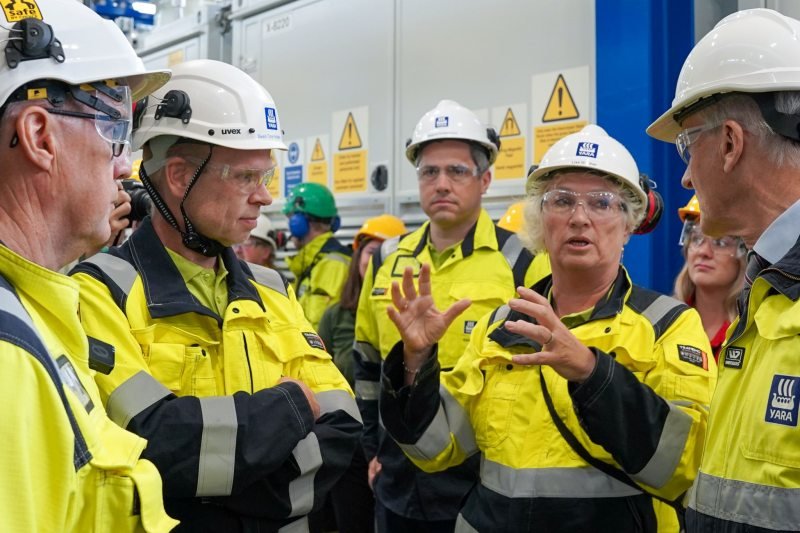Yara International has officially opened its renewable hydrogen plant at Herøya, Norway. Yara is now producing renewable hydrogen and ammonia and has already delivered the first tonnes of fertilizers made from renewable ammonia produced at this plant.
“This is a major milestone for Yara and for the decarbonization of the food value chain, shipping fuel, and other energy-intensive industries,” says Svein Tore Holsether, President & CEO of Yara.
The Norwegian Prime Minister, Mr. Jonas Gahr Støre, inaugurated the 24 MW renewable hydrogen plant at Herøya Industrial Park, the largest of its kind currently in operation in Europe. The hydrogen is produced with electrolysis of water and renewable energy, replacing natural gas as feedstock and annually cutting 41,000 tonnes of CO2 emissions from the site.
“This is a groundbreaking project and a testament to our mission to responsibly feed the world and protect the planet. I want to thank our dedicated employees who have worked tirelessly to get this cutting-edge production up and running, Enova for supporting the project, our partners, and our brave customers who are first movers towards a more sustainable future. We are very pleased to have delivered the first tonnes of low-carbon footprint fertilizers to Lantmännen, a partnership which serves as a concrete example of how collaboration across the entire food value chain is required to decarbonize. Together, we have made this important step towards decarbonizing hard-to-abate sectors,” says Holsether.
The low-carbon footprint fertilizers produced and delivered will be part of a new portfolio called Yara Climate Choice. These solutions will benefit crops while at the same time contributing to decarbonizing the food value chain and reducing climate impact. In addition to fertilizers produced with electrolysis of water and renewable energy, fertilizers based on low-carbon ammonia produced using carbon capture storage (CCS) will be a large part of Yara’s portfolio going forward.
“Renewable ammonia is an important part of the decarbonization puzzle; however, developing it at scale takes time. As the world is rapidly approaching 2030, we are also working to produce low-carbon ammonia with CCS to enable the hydrogen economy and develop the emerging markets for low-emission ammonia,” says Hans Olav Raen, CEO of Yara Clean Ammonia.
In 2023, Yara signed a binding CO2 transport and storage agreement with Northern Lights, the world’s first cross-border CCS agreement in operation. Yara aims to reduce its annual CO2 emissions by 800,000 tons from the ammonia production at Yara Sluiskil. Yara is also evaluating one to two world-scale low-carbon ammonia production projects with CCS in the US.
“The world needs to act urgently on multiple fronts to reach the goals of the Paris Agreement, and CCS is a critical steppingstone to decarbonize rapidly and profitably. The green transition will require investments, predictable framework conditions, a massive build-out of renewable energy and grid, continuously advancing technology, and a maturing market where demand and supply are developed simultaneously. The companies that take this seriously will have a competitive advantage. At Yara, we have already reduced our emissions by 45 percent since 2005, and with our strategy to profitably deliver decarbonized solutions quickly and at scale, produced with both renewable energy and CCS, we are uniquely positioned to deliver, both to shareholders, customers, employees, and society at large,” says Holsether.
Hydrogen is used to produce ammonia, which in turn is used to produce fertilizers and can also be used as shipping fuel. Ammonia is also an efficient energy- and hydrogen carrier.

About Yara International
Yara’s mission is to responsibly feed the world and protect the planet. We pursue a strategy of sustainable value growth through reducing emissions from crop nutrition production and developing low-emission energy solutions. Yara’s ambition is focused on growing a nature-positive food future that creates value for our customers, shareholders, and society at large and delivers a more sustainable food value chain.
To drive the green transition in fertilizer production, shipping, and other energy-intensive industries, Yara will produce ammonia with significantly lower emissions. We provide digital tools for precision farming and work closely with partners at all levels of the food value chain to share knowledge and promote more efficient and sustainable solutions.
Founded in 1905 to solve the emerging famine in Europe, Yara has established a unique position as the industry’s only global crop nutrition company. With 18,000 employees and operations in more than 60 countries, sustainability is an integral part of our business model. In 2023, Yara reported revenues of USD 15.5 billion.
About Yara Clean Ammonia
Yara Clean Ammonia is uniquely positioned to enable the hydrogen economy in a market expected to grow substantially over the next decades. We aim at significantly strengthening our leading global position as the world’s largest ammonia distributor, unlocking the green and blue value chains, and driving the development of clean ammonia globally.
Building on Yara’s leading experience within global ammonia production, logistics, and trade, Yara Clean Ammonia works towards capturing growth opportunities in low-emission fuel for shipping, power generation, low-carbon food production, and ammonia for industrial applications.
Yara Clean Ammonia operates the largest global ammonia network with 15 ships and has, through Yara, access to 18 ammonia terminals and multiple ammonia production and consumption sites across the world. Revenues and EBITDA for FY 2023 were USD 1.9 billion and USD 101 million, respectively. Yara Clean Ammonia is headquartered in Oslo, Norway.
Source Yara International

